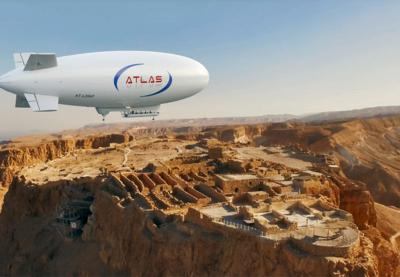Thu, Sep 10, 2020
This Location Allows Relatively Easy Transportation Of Materials And Components
Newly-established Israeli company, Atlas LTA Advanced Technology Ltd, has brought together leading experts from around the world in the unique field of lighter-than-air technology. The core team members have extensive experience in building airships and aerostats for all kinds of purpose, and together offer a solid technical background for the company’s current production activities and future developments.

Atlas's main goal is to introduce its green airships into everyday life, thereby reducing poisonous carbon emissions. The company is active in many fields, delivering practical, cost-effective solutions in the form of modern airships and aerostats. For example, Atlas-6/11 sightseeing airships are sparking curiosity at national parks and historic landmarks all over the world.
The advantages of the lighter-than-air technologies proposed by Atlas can also be clearly seen in the context of communications and surveillance missions. High altitude, long range, and unprecedented endurance of unmanned flight all contribute to making tethered aerostats or solar-powered airships a unique and highly-effective solution in several instances where traditional aircraft cannot be used. Besides the obvious economic advantages, their performance does not require the burning of any traditional fuel.
Atlas's flagship project is to build a new family of large-capacity transport airships, which will be capable of carrying oversized and overweight cargo of up to 165 tons, using safe helium buoyancy and dynamic lift made possible by low-emission hybrid-electric propulsion. Named ATLANT, this airship will significantly reduce transportation costs and will eventually change the world of cargo transportation. Since it does not require any special infrastructure, it can land in a desert, on water or even Arctic ice, making many hard-to-reach destinations much more accessible.
Based on the company’s latest innovations and practical achievements, this ambitious project applies important lessons learnt from its predecessors. Use of hydrogen as its fuel will make ATLANT the first zero-emission, large-capacity cargo aircraft. In the future, when the rules permit, it can be turned into a fully-autonomous unmanned cargo vehicle – the world’s largest UAV. The ATLANT is expected to be emission free within the next six to seven years.
More News
Decision Altitude (DA) A specified altitude (mean sea level (MSL)) on an instrument approach procedure (ILS, GLS, vertically guided RNAV) at which the pilot must decide whether to >[...]
Aero Linx: T-34 Association, Inc. The T-34 Association was formed in July 1975 so that individuals purchasing then military surplus T-34As had an organization which would provide s>[...]
As He Released The Brakes To Begin Taxiing, The Brake Pedals Went To The Floor With No Braking Action Analysis: The pilot reported that during engine start up, he applied the brake>[...]
“Legislation like the Mental Health in Aviation Act is still imperative to hold the FAA accountable for the changes they clearly acknowledge need to be made... We cannot wait>[...]
Also: IAE Acquires Diamond Trainers, Army Drones, FedEx Pilots Warning, DA62 MPP To Dresden Tech Uni The danger to the flight training industry and our future pilots is clear. Dona>[...]
 ANN's Daily Aero-Term (12.08.25): Decision Altitude (DA)
ANN's Daily Aero-Term (12.08.25): Decision Altitude (DA) ANN's Daily Aero-Linx (12.08.25)
ANN's Daily Aero-Linx (12.08.25) NTSB Final Report: Piper PA-31T3
NTSB Final Report: Piper PA-31T3 Aero-News: Quote of the Day (12.08.25)
Aero-News: Quote of the Day (12.08.25) Airborne-Flight Training 12.04.25: Ldg Fee Danger, Av Mental Health, PC-7 MKX
Airborne-Flight Training 12.04.25: Ldg Fee Danger, Av Mental Health, PC-7 MKX



